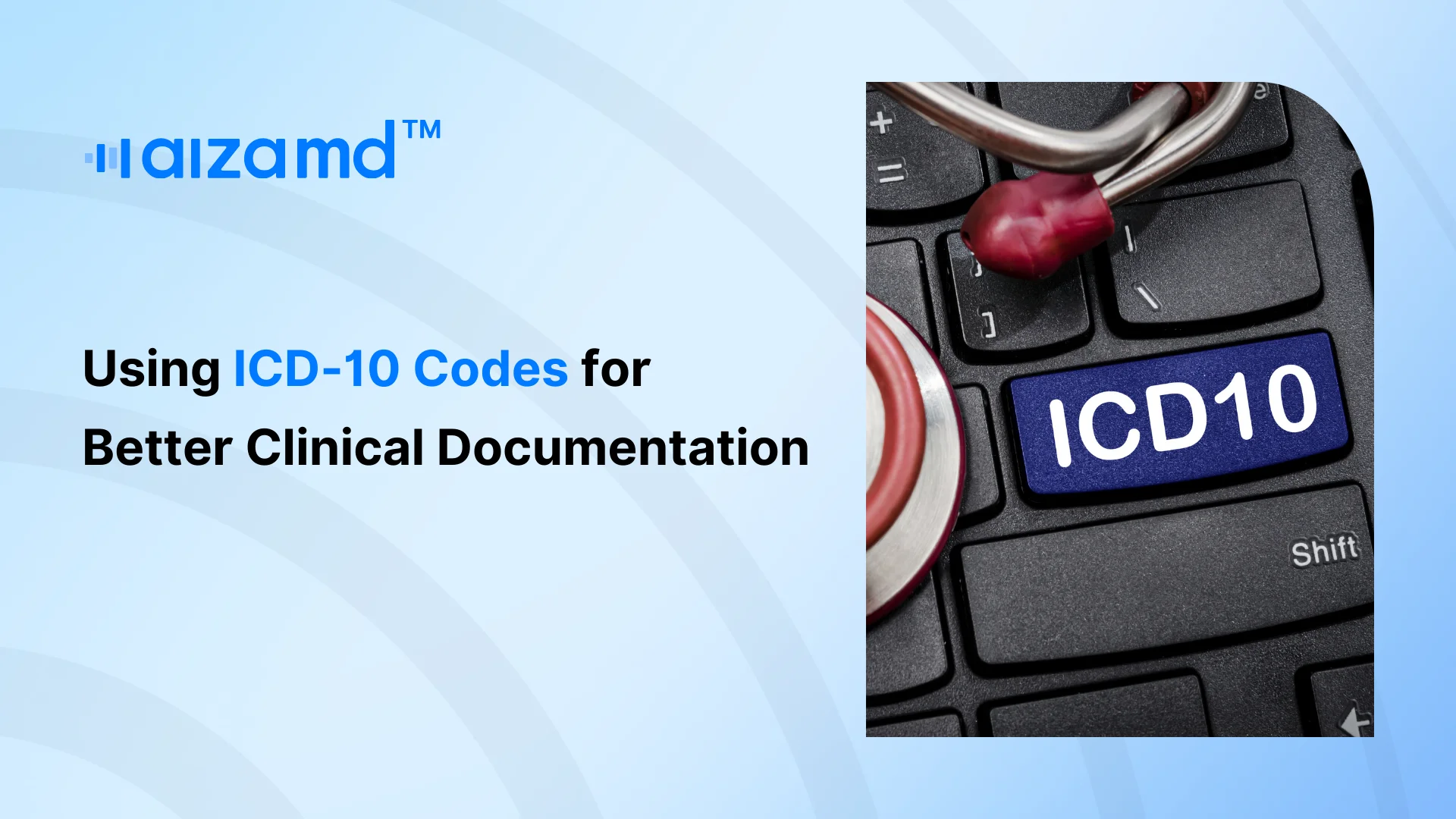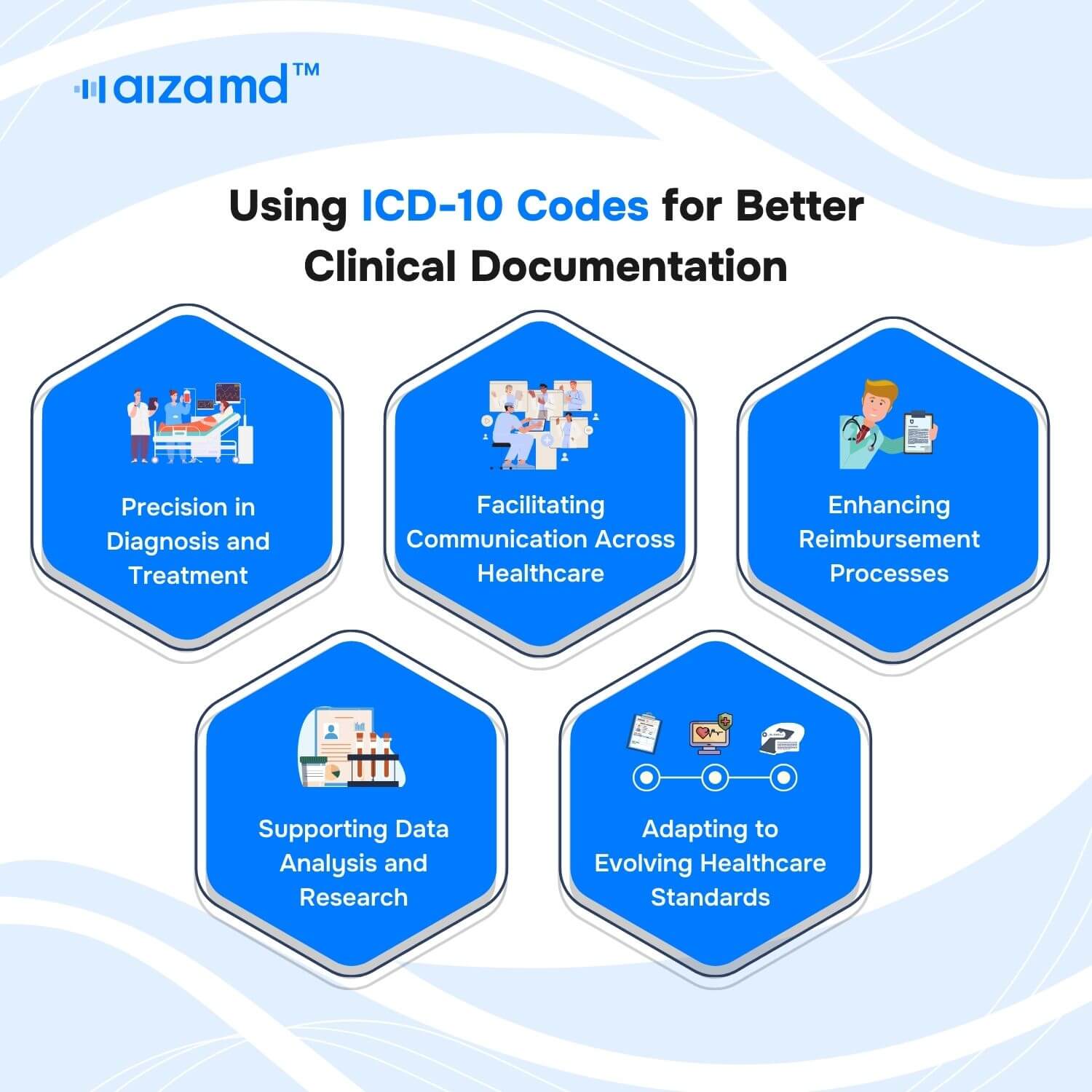Using ICD-10 Codes for Better Clinical Documentation

Clinical documentation is the backbone of effective healthcare delivery, providing a detailed record of patient encounters, treatments, and outcomes. Among the many tools available to healthcare professionals, the International Classification of Diseases, 10th Edition (ICD-10) codes play a pivotal role in enhancing the quality and accuracy of clinical documentation. In this blog post, we explore the ways in which using ICD-10 codes, along with innovative solutions like AizaMD™, can significantly improve clinical documentation practices.
Precision in Diagnosis and Treatment:
- Detailed Documentation: ICD-10 codes offer a level of granularity that allows healthcare professionals to precisely document diagnoses and treatments.
- Extensive Coverage: With more than 68,000 codes covering a wide range of conditions, physicians can accurately capture the complexity of patient cases.
- Improved Decision-Making: This precision not only aids in effective communication among healthcare providers but also contributes to better-informed decision-making and improved patient care.
Facilitating Communication Across Healthcare:
- Standardized Language: ICD-10 codes serve as a standardized language that transcends different medical specialties and facilitates seamless communication among healthcare teams.
- Universal Understanding: Whether sharing information with specialists, nurses, or administrative staff, using a common coding system ensures clarity and consistency in clinical documentation.
Enhancing Reimbursement Processes:
- Direct Link to Reimbursement: Accurate clinical documentation is directly linked to reimbursement in the healthcare industry.
- Minimized Claim Denials: Proper utilization of ICD-10 codes ensures that healthcare providers can substantiate the medical necessity of services rendered, leading to fair and timely reimbursement.
Supporting Data Analysis and Research:
- Data-Driven Insights: The specificity of ICD-10 codes allows for the extraction of valuable insights from clinical documentation.
- Enhanced Research Capabilities: Healthcare organizations can use aggregated data to identify trends, assess the effectiveness of treatments, and contribute to medical research for the benefit of future patient care.
Adapting to Evolving Healthcare Standards:
- Keeping Up with Changes: Staying current with ICD-10 codes means staying aligned with evolving healthcare standards and regulatory requirements.
- Reflecting Medical Advancements: Regular updates to the coding system reflect advancements in medical knowledge, technology, and the changing landscape of healthcare.

Unlocking Efficiency with AizaMD™:
- Integration with ICD-10: AizaMD™ seamlessly integrates with ICD-10 coding, automating repetitive tasks and streamlining the documentation process.
- Time and Effort Savings: By leveraging AizaMD™, healthcare professionals can save valuable time and effort, ensuring accurate and efficient use of ICD-10 codes.
Harnessing the Power of ICD-10 and AizaMD™ for Better Patient Outcomes
In conclusion, using ICD-10 codes and embracing innovative solutions like AizaMD™ is not just a compliance requirement; it is a strategic approach to improving clinical documentation and, subsequently, patient outcomes. The precision, communication facilitation, financial benefits, data analysis support, and adaptability to industry standards make ICD-10 and AizaMD™ invaluable tools in the hands of healthcare professionals. By embracing and mastering the use of these tools, clinicians can contribute to a more efficient, collaborative, and data-driven healthcare ecosystem, ultimately leading to better patient care and overall healthcare excellence.